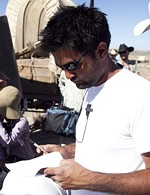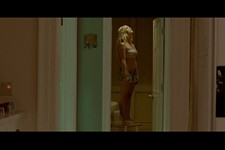Into the West
Kelly Reichardt re-creates the hazards of the Oregon Trail in 'Meek's Cutoff'
By Marjorie Baumgarten, Fri., May 6, 2011
On the Oregon Trail in 1845, a wagon train of three families led by the mountain man Stephen Meek is perilously lost, even though none are yet fully aware of that fact. It is here that director Kelly Reichardt's film begins. Actually, Meek's Cutoff opens in silence, or more accurately, with the sounds that become prominent in the absence of conversation: the lonely sound of the wind whipping across the wide-open territory, the inexorability of the water gushing past the travelers as they cross a stream, and the ominous heaving of the oxen and the creaking of the wagons as they move over the rocky terrain. This is not a conventional Western filled with the sounds and images of gunfights and battles for primacy. Meek's Cutoff is a story about American settlers stuck in the wilderness, caught between believing in the wisdom of their guide, which is looking increasingly questionable, or following their inner compasses, which point in directions about which they are also leery. As with her previous films – River of Grass, Old Joy, and Wendy and Lucy – Reichardt again delivers a road movie whose travelers are in the midst of a distinctly American journey. We spoke with Reichardt in January at the Sundance Film Festival, where Meek's Cutoff screened as a Spotlight selection.
Austin Chronicle: Was the idea for you and screenwriter Jon Raymond to make a different kind of Western?
Kelly Reichardt: Yes. I mean, when we were making the film I wasn't calling it a Western. I kept saying "desert film," staying away from the word "Western."
AC: You read a lot of settlers' diaries while researching this project. What did you learn from them?
KR: First were the Meek diaries, the people that were on that wagon train, which was a much larger wagon train than we depicted. Then we got immersed in lots of diaries from the period, and Jon's screenplay ultimately took all the liberties we wanted. So [the film] is not true to the Meek story completely. But the diaries of the period were really fascinating and really eye-opening to me – just all of a sudden to be in this atmosphere and story, which you mostly relate to through the genre of the Western, and all of a sudden to be hearing the story through a different voice that I hadn't recalled being depicted. [The diaries are] about the chores and the labor. At the beginning, people are leaving Missouri with all these ideas of what they're heading into – this heaven on Earth – their diaries are so romantic at the beginning of the journey. And by the time we catch up with them after six months of walking across the country, their diaries get really stripped down to "Built a fire, dug a hole, pitched a tent" – it's just so stripped down. And so that's where we really wanted to enter the story.
AC: It's so revelatory about women's experience in that world. Their chores are relentless, and their attire quite limiting. Their bonnets block all peripheral vision, like blinders on a horse.
KR: Yes. I think the women write a lot about their friendships. The woman whose journal really stays with me says at the beginning of it, "I'm keeping this diary should my husband ever want to get to know me." Just to think that you were in constant community, constantly surrounded by people [and having] no privacy, yet it was incredibly lonely at the same time. The men had other concerns, and I think intimacy was found with your girlfriends.
AC: Another thing in regard to the Western is its confrontation of the "other" in the form of the American Indian the wagon train encounters. I really like the way it's dealt with in Meek's and left kind of ambiguous.
KR: I'm interested in films that are not about answering questions but about asking questions and demanding a little bit more interaction from the audience, where you can bring your own experience and point of view and fill in the blanks for yourself. I mean, I can think about it in different ways: Is it a metaphor for where people ended up or where we ended up? Or what would have happened if we had been more [tolerant] as opposed to genocidal? Environmentally, where would be if we had taken on a bit more of the Native American approach to living? Or is it just personal to this particular group of people, like the microscopic versus the bigger question? It would be nice if the film could leave the door open to all these possibilities of thought.
AC: I like that – thinking about it in contemporary terms as well as a period piece and what that means. It's sad that there aren't too many modern Westerns; they're just such a great means of talking about American culture.
KR: And the repetitiveness of our mistakes, I guess, to large degree.
AC: How difficult was it to mount a period piece like this, especially on a small budget?
KR: It was the furthest stretch I ever felt as a filmmaker. I felt at some point, "Wow, we are spreading ourselves really thin here." You know, as [co-star] Paul Dano would say, "This is the hardest film I've ever worked on," and then all the other actors would nod their heads like, "Yes, yes, yes, yes." There were so many things about it that put you in mind of the people you were making the film about. Not to compare the two lives, but for our state of being we did not really have a lot of comforts. We were shooting where [the Meek wagon train] was actually lost and nothing's really happened. We were finding pieces of wagons and other discarded possessions while we were there. You are not the boss; the terrain rules. And it's rattlesnake country. We were also dealing with oxen, which are not horses or bulls. The temperature, I think, when we started shooting was 110 degrees, and the last week of shooting it was snowing. The desert kind of kicks your ass.
Our assistant camerawoman, who also worked on Wendy and Lucy and is really one of the tougher women I know and not a complainer of any sort, matter-of-factly said to me one day, "There's no part of me that's not in pain." And I knew that she was just stating what was true. But I would also say that it was so hard and rigorous, but it was such an amazing crew, and I had these really great actors. At the end of the day, you're riding home covered in dust and exhausted, and you're crossing a playa with the most beautiful sunset you've ever seen with these people that you've worked so hard with. I mean, you're either up for an adventure like that [or you're not]. The desert's a great leveler.
The desert was a great equalizer for us as filmmakers, too. The drivers were staying in the exact same motel that [co-stars] Bruce Greenwood and Michelle Williams were staying in. There's nothing else out there, so there we all were. Class was gone now for this moment. Plus, [it was interesting] to roll a bunch of filmmakers into a completely Republican town and have your ideas of what that would be like [altered]. Burns, Oregon, is the least populated town in America. We found this complete camaraderie with the town, which is really depressed and has a lot of people out of work. Many came to work on our film, and we needed the expertise of these people. We realized how, outside the city, people's politics are about their cattle and completely different things. And not me personally but my crew people, who went into the Safeway every day and were more out in the town than I would be, knew who's going to Iraq and who's pregnant and so forth. We would have been really lost without the local rangers, and we would have not succeeded without the support of that town. Our meals were at the Elks Lodge every night, where they hold their bingo and [it's] the bar where everyone goes. You've worked a hard day and I've worked a hard day, and you bought the beers yesterday and I'll get the beers today: It's kind of a wonderful thing like that.
Meek's Cutoff opens Friday, May 6, at the Regal Arbor Cinema and Violet Crown Cinema. See Film Listings for showtimes.












